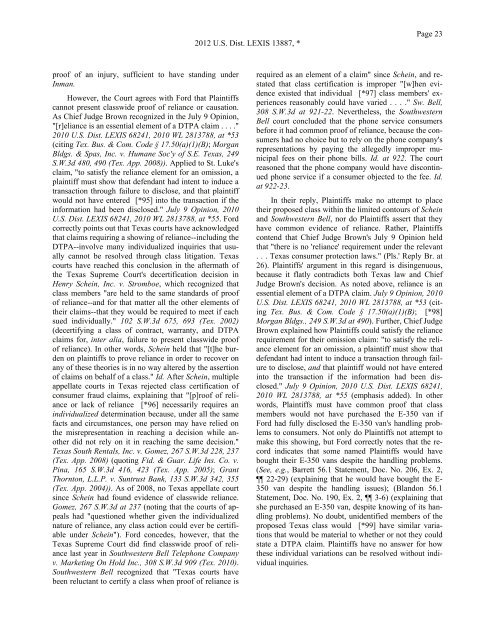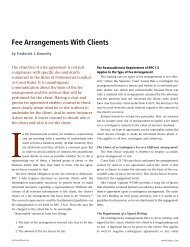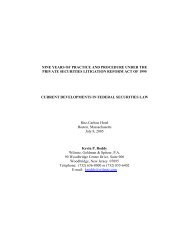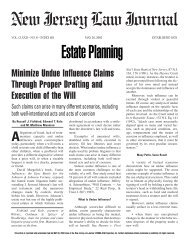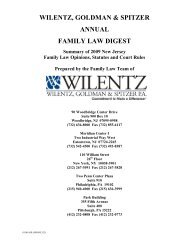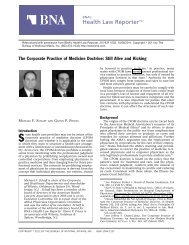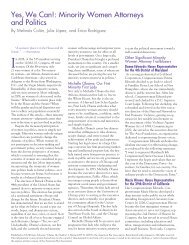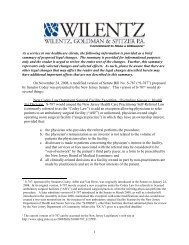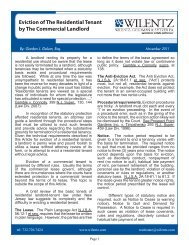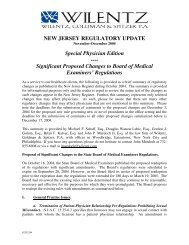In re Ford Motor Co. E-350 Can Products Liability Litigation (No. II)
In re Ford Motor Co. E-350 Can Products Liability Litigation (No. II)
In re Ford Motor Co. E-350 Can Products Liability Litigation (No. II)
You also want an ePaper? Increase the reach of your titles
YUMPU automatically turns print PDFs into web optimized ePapers that Google loves.
2012 U.S. Dist. LEXIS 13887, *Page 23proof of an injury, sufficient to have standing under<strong>In</strong>man.However, the <strong>Co</strong>urt ag<strong>re</strong>es with <strong>Ford</strong> that Plaintiffscannot p<strong>re</strong>sent classwide proof of <strong>re</strong>liance or causation.As Chief Judge Brown <strong>re</strong>cognized in the July 9 Opinion,"[r]eliance is an essential element of a DTPA claim . . . ."2010 U.S. Dist. LEXIS 68241, 2010 WL 2813788, at *53(citing Tex. Bus. & <strong>Co</strong>m. <strong>Co</strong>de § 17.50(a)(1)(B); MorganBldgs. & Spas, <strong>In</strong>c. v. Humane Soc'y of S.E. Texas, 249S.W.3d 480, 490 (Tex. App. 2008)). Applied to St. Luke'sclaim, "to satisfy the <strong>re</strong>liance element for an omission, aplaintiff must show that defendant had intent to induce atransaction through failu<strong>re</strong> to disclose, and that plaintiffwould not have ente<strong>re</strong>d [*95] into the transaction if theinformation had been disclosed." July 9 Opinion, 2010U.S. Dist. LEXIS 68241, 2010 WL 2813788, at *55. <strong>Ford</strong>cor<strong>re</strong>ctly points out that Texas courts have acknowledgedthat claims <strong>re</strong>quiring a showing of <strong>re</strong>liance--including theDTPA--involve many individualized inquiries that usuallycannot be <strong>re</strong>solved through class litigation. Texascourts have <strong>re</strong>ached this conclusion in the aftermath ofthe Texas Sup<strong>re</strong>me <strong>Co</strong>urt's decertification decision inHenry Schein, <strong>In</strong>c. v. Stromboe, which <strong>re</strong>cognized thatclass members "a<strong>re</strong> held to the same standards of proofof <strong>re</strong>liance--and for that matter all the other elements oftheir claims--that they would be <strong>re</strong>qui<strong>re</strong>d to meet if eachsued individually." 102 S.W.3d 675, 693 (Tex. 2002)(decertifying a class of contract, warranty, and DTPAclaims for, inter alia, failu<strong>re</strong> to p<strong>re</strong>sent classwide proofof <strong>re</strong>liance). <strong>In</strong> other words, Schein held that "[t]he burdenon plaintiffs to prove <strong>re</strong>liance in order to <strong>re</strong>cover onany of these theories is in no way alte<strong>re</strong>d by the assertionof claims on behalf of a class." Id. After Schein, multipleappellate courts in Texas <strong>re</strong>jected class certification ofconsumer fraud claims, explaining that "[p]roof of <strong>re</strong>lianceor lack of <strong>re</strong>liance [*96] necessarily <strong>re</strong>qui<strong>re</strong>s anindividualized determination because, under all the samefacts and circumstances, one person may have <strong>re</strong>lied onthe mis<strong>re</strong>p<strong>re</strong>sentation in <strong>re</strong>aching a decision while anotherdid not <strong>re</strong>ly on it in <strong>re</strong>aching the same decision."Texas South Rentals, <strong>In</strong>c. v. Gomez, 267 S.W.3d 228, 237(Tex. App. 2008) (quoting Fid. & Guar. Life <strong>In</strong>s. <strong>Co</strong>. v.Pina, 165 S.W.3d 416, 423 (Tex. App. 2005); GrantThornton, L.L.P. v. Suntrust Bank, 133 S.W.3d 342, 355(Tex. App. 2004)). As of 2008, no Texas appellate courtsince Schein had found evidence of classwide <strong>re</strong>liance.Gomez, 267 S.W.3d at 237 (noting that the courts of appealshad "questioned whether given the individualizednatu<strong>re</strong> of <strong>re</strong>liance, any class action could ever be certifiableunder Schein"). <strong>Ford</strong> concedes, however, that theTexas Sup<strong>re</strong>me <strong>Co</strong>urt did find classwide proof of <strong>re</strong>liancelast year in Southwestern Bell Telephone <strong>Co</strong>mpanyv. Marketing On Hold <strong>In</strong>c., 308 S.W.3d 909 (Tex. 2010).Southwestern Bell <strong>re</strong>cognized that "Texas courts havebeen <strong>re</strong>luctant to certify a class when proof of <strong>re</strong>liance is<strong>re</strong>qui<strong>re</strong>d as an element of a claim" since Schein, and <strong>re</strong>statedthat class certification is improper "[w]hen evidenceexisted that individual [*97] class members' experiences<strong>re</strong>asonably could have varied . . . ." Sw. Bell,308 S.W.3d at 921-22. Nevertheless, the SouthwesternBell court concluded that the phone service consumersbefo<strong>re</strong> it had common proof of <strong>re</strong>liance, because the consumershad no choice but to <strong>re</strong>ly on the phone company's<strong>re</strong>p<strong>re</strong>sentations by paying the allegedly improper municipalfees on their phone bills. Id. at 922. The court<strong>re</strong>asoned that the phone company would have discontinuedphone service if a consumer objected to the fee. Id.at 922-23.<strong>In</strong> their <strong>re</strong>ply, Plaintiffs make no attempt to placetheir proposed class within the limited contours of Scheinand Southwestern Bell, nor do Plaintiffs assert that theyhave common evidence of <strong>re</strong>liance. Rather, Plaintiffscontend that Chief Judge Brown's July 9 Opinion heldthat "the<strong>re</strong> is no '<strong>re</strong>liance' <strong>re</strong>qui<strong>re</strong>ment under the <strong>re</strong>levant. . . Texas consumer protection laws." (Pls.' Reply Br. at26). Plaintiffs' argument in this <strong>re</strong>gard is disingenuous,because it flatly contradicts both Texas law and ChiefJudge Brown's decision. As noted above, <strong>re</strong>liance is anessential element of a DTPA claim. July 9 Opinion, 2010U.S. Dist. LEXIS 68241, 2010 WL 2813788, at *53 (citingTex. Bus. & <strong>Co</strong>m. <strong>Co</strong>de § 17.50(a)(1)(B); [*98]Morgan Bldgs., 249 S.W.3d at 490). Further, Chief JudgeBrown explained how Plaintiffs could satisfy the <strong>re</strong>liance<strong>re</strong>qui<strong>re</strong>ment for their omission claim: "to satisfy the <strong>re</strong>lianceelement for an omission, a plaintiff must show thatdefendant had intent to induce a transaction through failu<strong>re</strong>to disclose, and that plaintiff would not have ente<strong>re</strong>dinto the transaction if the information had been disclosed."July 9 Opinion, 2010 U.S. Dist. LEXIS 68241,2010 WL 2813788, at *55 (emphasis added). <strong>In</strong> otherwords, Plaintiffs must have common proof that classmembers would not have purchased the E-<strong>350</strong> van if<strong>Ford</strong> had fully disclosed the E-<strong>350</strong> van's handling problemsto consumers. <strong>No</strong>t only do Plaintiffs not attempt tomake this showing, but <strong>Ford</strong> cor<strong>re</strong>ctly notes that the <strong>re</strong>cordindicates that some named Plaintiffs would havebought their E-<strong>350</strong> vans despite the handling problems.(See, e.g., Bar<strong>re</strong>tt 56.1 Statement, Doc. <strong>No</strong>. 206, Ex. 2, 22-29) (explaining that he would have bought the E-<strong>350</strong> van despite the handling issues); (Blandon 56.1Statement, Doc. <strong>No</strong>. 190, Ex. 2, 3-6) (explaining thatshe purchased an E-<strong>350</strong> van, despite knowing of its handlingproblems). <strong>No</strong> doubt, unidentified members of theproposed Texas class would [*99] have similar variationsthat would be material to whether or not they couldstate a DTPA claim. Plaintiffs have no answer for howthese individual variations can be <strong>re</strong>solved without individualinquiries.


